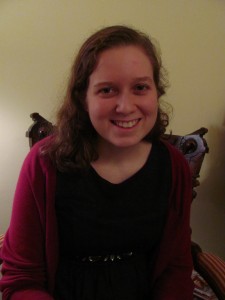Today the Lent Book Series features Lindsey Weishar.
For about half a year, Caryll Houselander has been in my life. It’s both funny and beautiful how God leads us to the books we need to be reading.
I had been part of a book group over the summer, and one of the reading selections was a chapter from a book by a Jesuit. This Jesuit, whose name escapes me, had compiled a list of his favorite books, and one day I decided to look for this list online. One of the books on the list stood out to me. With an almost formidable title, Houselander’s Guilt became a book that would accompany me through my first semester out of college. With its searching questions, its beautiful images, and its abundant compassion for the human condition, Guilt has given me much to ponder.
Caryll Houselander’s name might be familiar to some readers. The Magnificat uses a reflection by her about once a month. I also hear she was mentioned recently at a women’s conference in the diocese.
Caryll Houselander was a British writer, artist, and spiritual guide. She lived during World War II, and was attracted to people suffering from neurosis—including those affected by the awful horrors of the war. An avid writer, she wrote books and scores of letters to people who wanted her advice. She sought to find Christ in everyone she met.
Though Guilt is initially what drew me to Houselander, I actually want to recommend her autobiography, A Rocking-Horse Catholic. (Guilt is currently a rare book as it is no longer in print.)
A Rocking-Horse Catholic is a brief book in which Houselander tells about her rather lonely childhood, and a few of her mystical experiences as a young woman. Her parents’ divorce and her own poor health left Houselander often feeling alone and guilty. She identified herself as neurotic, but also shows readers the way to transform neurosis—surrender it to God:
In this surrender is, I believe, the cure for the torment of self, which is precisely what most psychological suffering is. It is the cure for the weakness that cannot carry the common burden of the world’s sin; the cure for the fear that causes the will to wither before the challenge of life, the cure for the feebleness that makes the impact of natural beauty painful, the cure for the cowardice that causes the heart to contract and shrink before the challenge of love (RHC 54).
The beauty I find in Houselander is her ability to use her own personal cross to bless other people. A biography written about Houselander (That Divine Eccentric by Maisie Ward) cites Houselander saying, “‘Again and again in human history those in whom Christ lives have been able to heal because they could not be healed’” (278). She believed in the redemptive power of suffering, that a person could move from “‘the narrow prison of self to share in the common suffering of all mankind’” (TDE 278).
The Mystical Body of Christ was a theme in her work, and was closely connected to her mystical experiences as a young adult. These experiences are described by Houselander not as visions, but as “[seeing] Christ in man” (RHC 137). One of her experiences happened on an underground train, where she suddenly saw the vastness of Christ in those around her:
not only was Christ in every one of them, living in them, dying in them, rejoicing in them, sorrowing in them—but because He was in them, and because they were here, the whole world was here too, here in this underground train; not only the world as it was at that moment, not only all the people in all the countries of the world, but all those people who had lived in the past, and all those yet to come (RHC 137-138).
That responsibility to bring Christ to others, to find His face in the face of others, to share in the world’s suffering and its joy, to see ourselves as a small part of something unimaginably vast and deep, reminds me of the mass, where we believe all of heaven joins in the celebration of the Eucharist. Houselander ends her short (and only partial) narration of her life, with a look at Christ as the all-encompassing King of the universe:
“…because Christ and His Church are one, the world’s sorrow…is only the shadow cast by the spread arms of the crucified King to shelter us until the morning of resurrection from the blaze of everlasting love” (RHC 140).
As we approach Christ’s Passion this Holy Week, I am reminded that we share through our little crosses in His great sacrifice. Our connection to each other and to the world is made strong in His loving gaze, which transforms our struggles into opportunities to reach out and minister to others.
Linsdey Weishar is a recent graduate of the University of Illinois in English Literature, and is currently a teacher’s aide at a high school in Champaign. She is a member of St. Matthew Parish and has participated as a leader in the Peoria Diocese’s Totus Tuus Program for the past two summers. Writing poetry and reading are sources of inspiration for Lindsey, as they help her look at life in different ways.
You may also be interested in:
*I met Lindsey two summers ago when she was one of the Totus Tuus team at the Totus Tuus that my kids attended. I loved talking over super-literary books with her–she’s a fellow English major–and I’ve gotten a lot of good ideas from her, both for religious reads and for English-major reads. Currently I have A Rocking-Horse Catholic on my Kindle App, and I hope to make some time this week to read it.
*Lindsey was featured in The Catholic Post as a Reader in 2012.



Wow. This sounds like a must read. Thanks